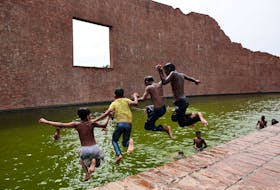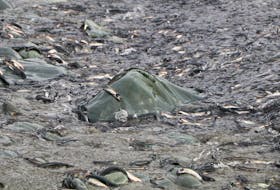Broken windows, peeled-away siding, displaced outdoor furniture and swamped boats are casualties from last week’s gale-force winds. Hopefully, the storm-scattered debris will be retrieved or returned to its owners, but much of it will be left for spring clean-up, if picked up at all.
In the same way, severe weather can displace fishing gear, far more difficult to recover once lost. Gear can also go missing when caught on other gear, vessels, bottom habitats or the seafloor.
Take crab pots, for example—the baited conical traps are a common sight, stacked on wharfs. When in season, hundreds of thousands of those pots can be in the water at any given time. With an estimated annual 8 per cent pot loss of the crab fishery alone (based on work by Georgina Bishop), for every 100,000 pots, some 8,000 will be lost.
Over time, these “ghost pots,” unclaimed gear as they are, continue to fish unless the gear fails. Given it takes five years for a standard pot to fail (Bishop), lost crab pots could continue to harvest for years.
But in 2013, Fisheries and Oceans Canada (DFO) required fishers to use biodegradable twine on their pots, forming an escape panel, in the event the pot is lost or abandoned (rarely, fishing gear is intentionally discarded, but it happens). Finding a solution for this problem—both a conversation and industry issue—started in the industry itself, with the inshore crab committee for Conception Bay leading the cause, then taken up by the Centre for Sustainable Aquatic Resources at Marine Institute, among other supporters.
Now DFO is calling on small business leaders to take conservation and industry progress to the next level. In early November, DFO launched three of seven “plastics challenges” to 1) remove ghost fishing gear altogether; 2) create new sustainable gear and technology; and 3) recycle waste from glass fiber-reinforced plastic. The challenges align with the G7 Oceans Plastics Charter (which Canada signed in September, then also becoming the 13th nation to join the 2015 World Animal Protection's Global Ghost Gear Initiative); the 2030 UN Sustainable Development Goals (signed in 2015); and DFO’s mandate toward marine sector sustainability, safety and economic prosperity.
Withiout question, this work has immediate economic benefit, reducing harvest loss to ghost fishing gear. But there may well be a serious career opportunity in fishing for plastics too. Plastics (including microplastics) make up the large majority of marine litter in our oceans. Reducing single-use plastics like bags, bottles and straws is receiving attention, particularly since anyone can reduce their use. But lost fishing gear—pots, nets, ropes, traps, crates and baskets—comprised of, for example, nylon, polyethylene and polypropylene, may pose a greater threat, which fewer can immediately address.
Fortunately, there are home-grown solutions underway. Marine Institute’s masters student, Jackie Saturno is finding the most environmentally friendly fishing rope — recently featured on CBC’s “Waves of Change” series, “exploring the single-use plastic we're discarding.” Also, Fogo Island’s Shorefast Foundation supported a trial of eco-friendly cod traps, offering commercial and conservation benefits over cod pots and gillnets (Marine Institute’s Brett Favaro is involved in this and Saturno’s work). Internationally, the Netherlands has launched the “Fishing for Litter” program, which provides reusable bags to fishing vessels for collecting litter entangled in fishing gear; and harbour depots for litter disposal/recycling. That program has applicability here — and now, there’s an opportunity to fund it.
The recently launched challenges will put $150,000 on the table for up to six months for any Phase 1 grant; and up to $1-million for up to two years for each Phase 2 grant. They are specifically seeking involvement of small businesses.
At a time when the unemployment rate has dropped across Canada, unfortunately, it continues to rise in Newfoundland and Labrador. What better time to put our local, traditional fishing know-how to use as a solution for an immediate, global plastics problem in our oceans?
We have the ideas, but is small business at the ready to endorse them?
Jennifer Thornhill Verma
Ottawa
Related stories:
Ocean, shoreline continue to be dumping grounds
Involve business in ocean plastics pollution issue, talks: McKenna

![['A plastic bag floats just under the surface of the ocean. A recent study says that biodegradable plastic is creating a huge problem in the ocean as it breaks down and is introduced into our food chain. —Thinstock image']](https://saltwire.imgix.net/wangersky-column-oct7-2729474.jpg?cs=srgb&fit=crop&h=568&w=847&dpr=1&auto=format%2Cenhance%2Ccompress)







